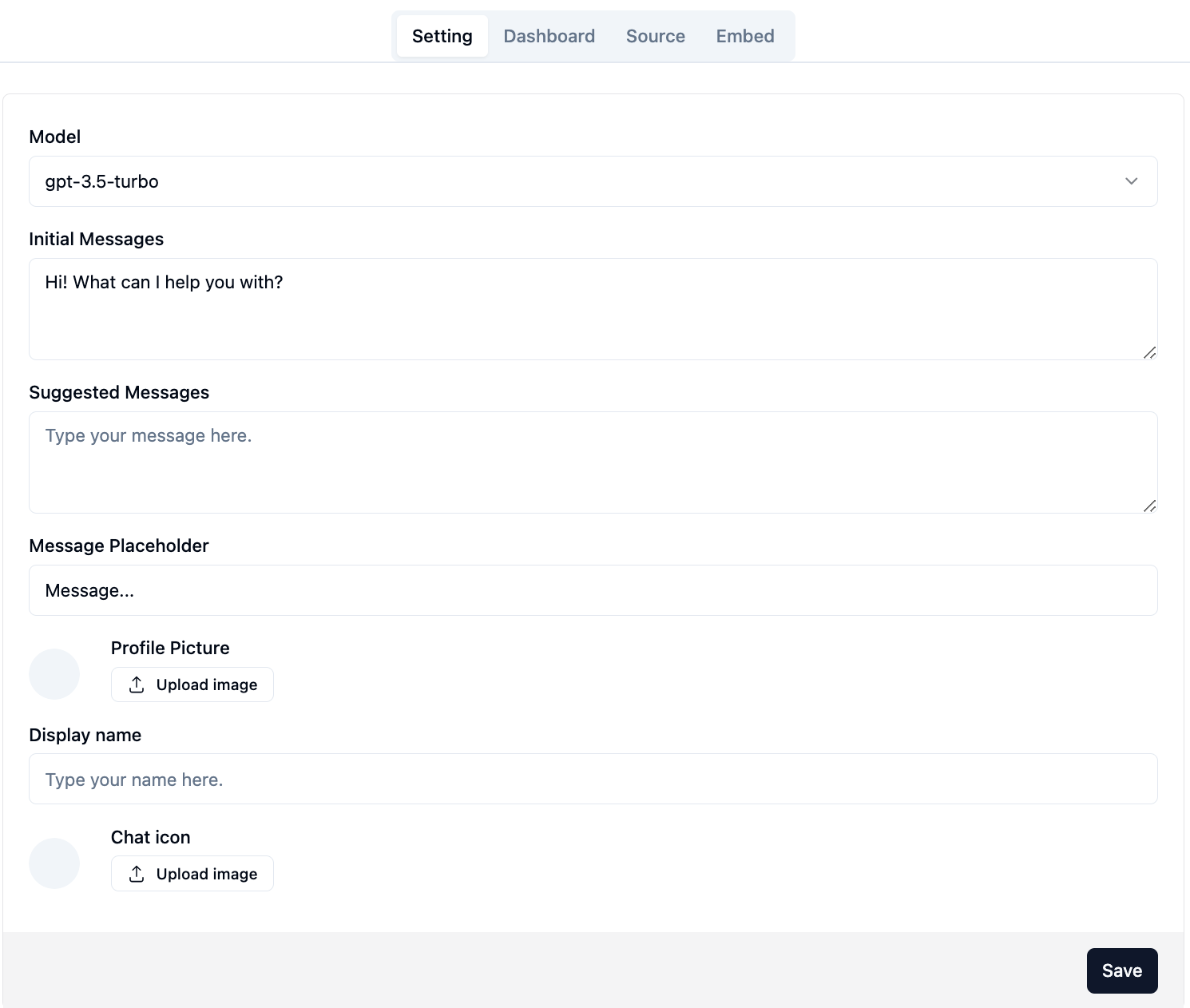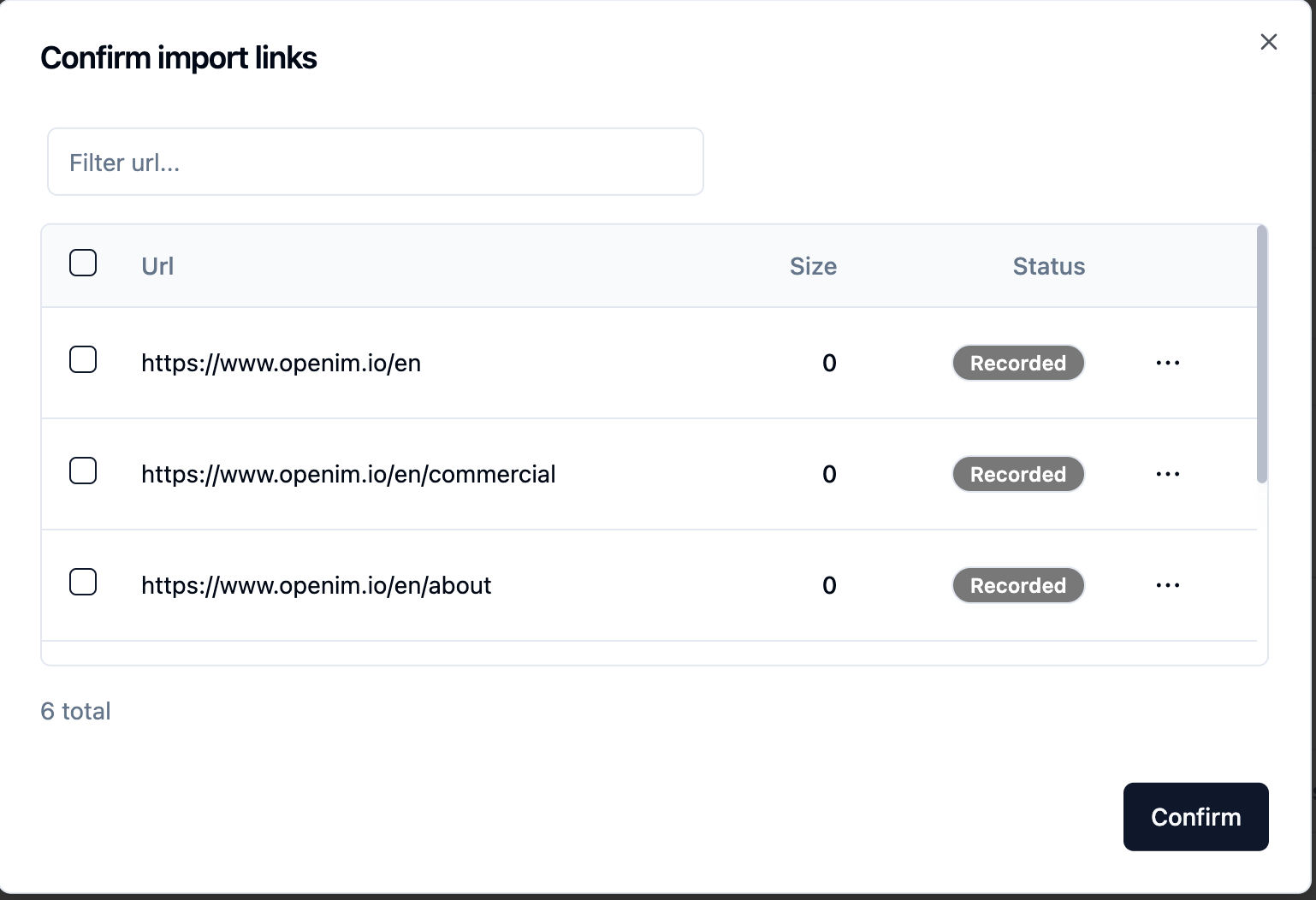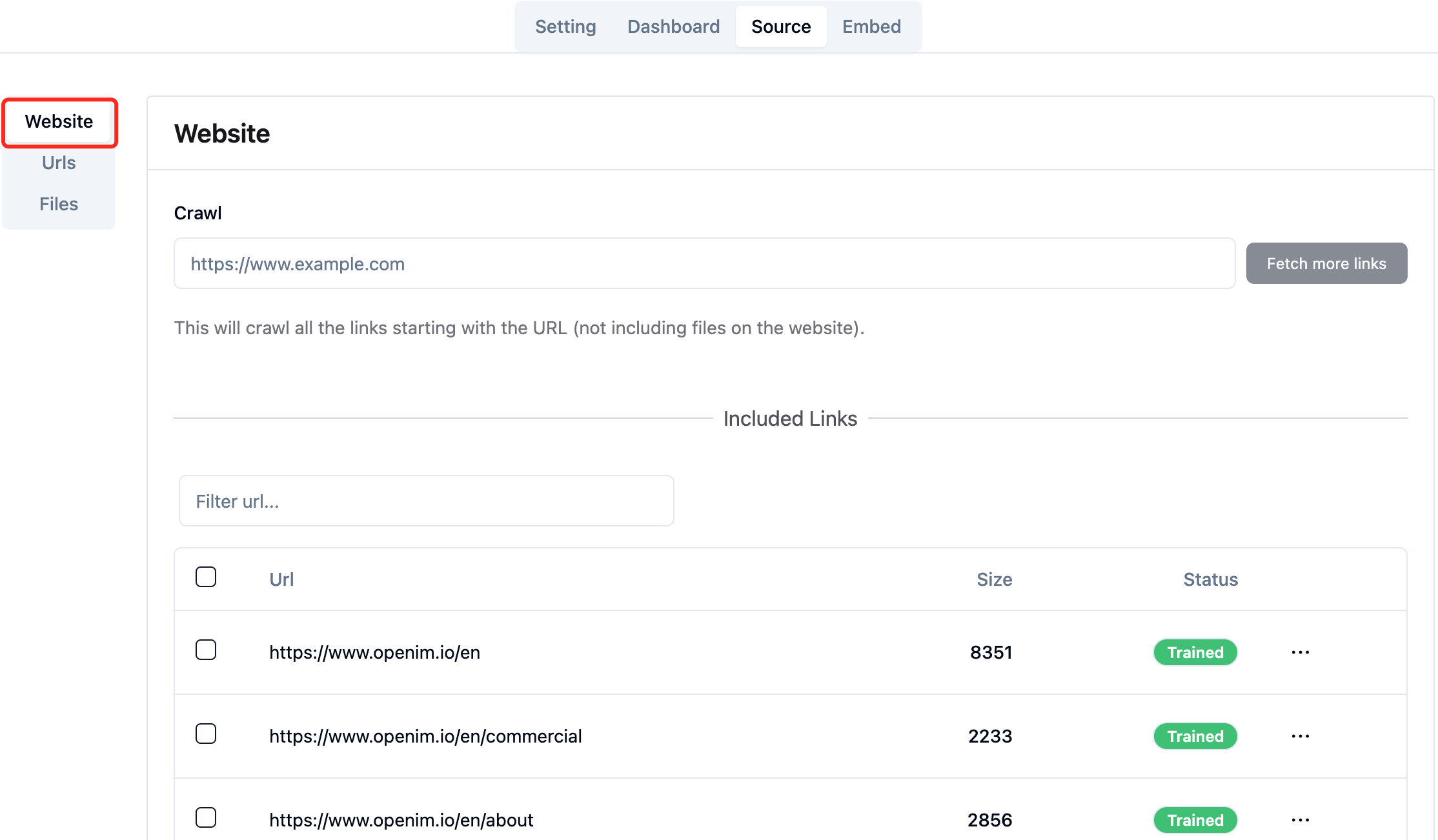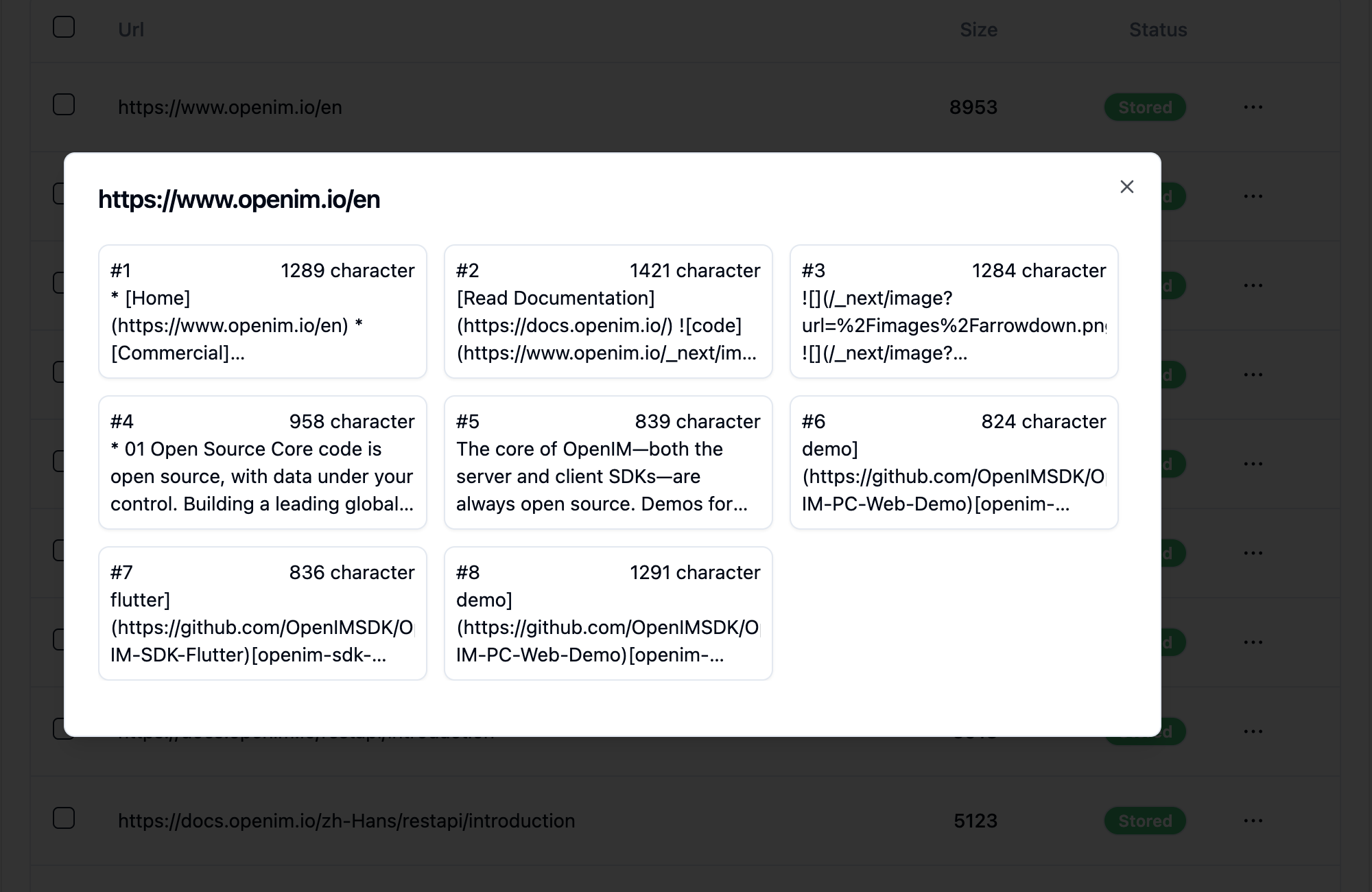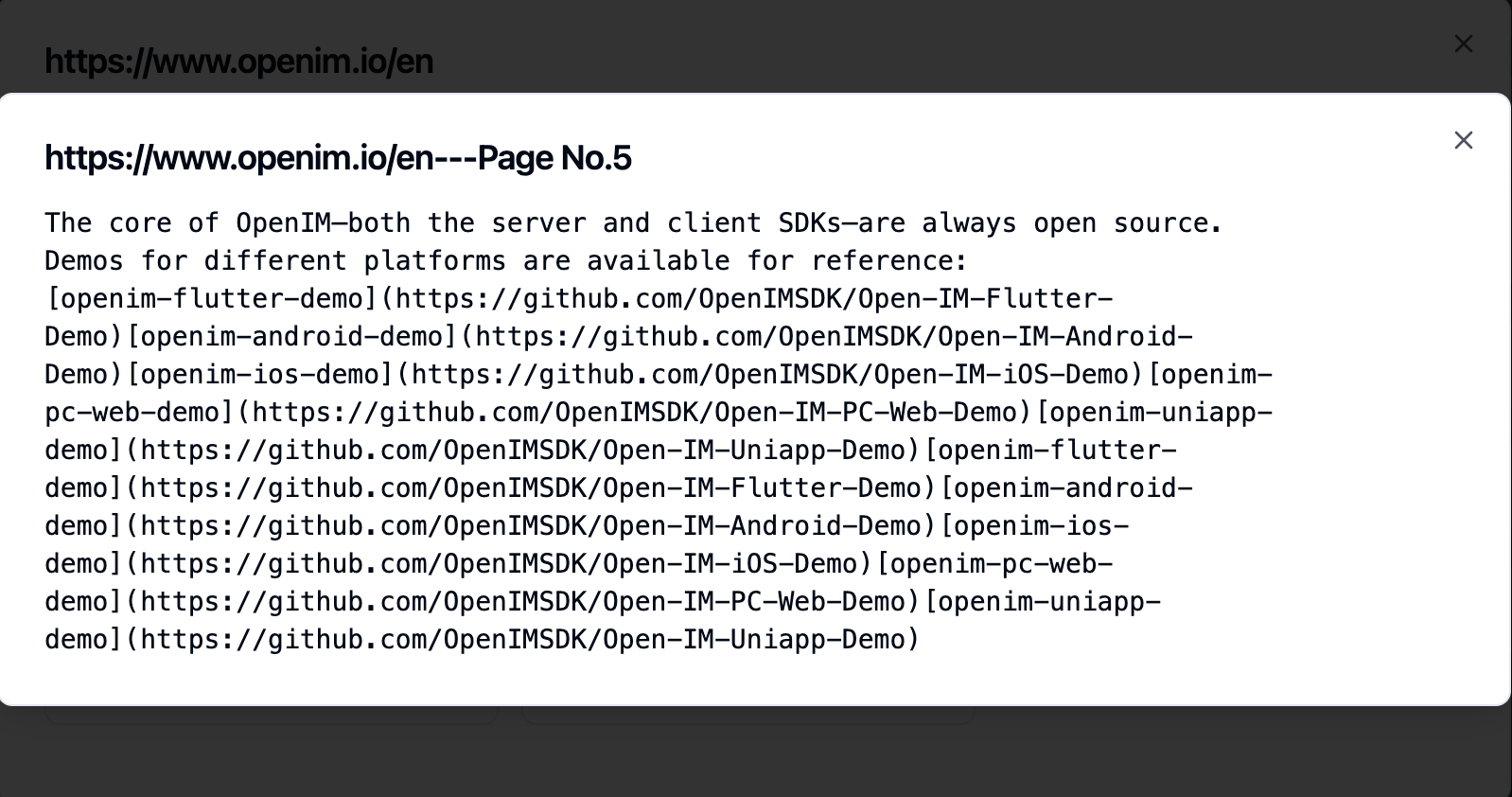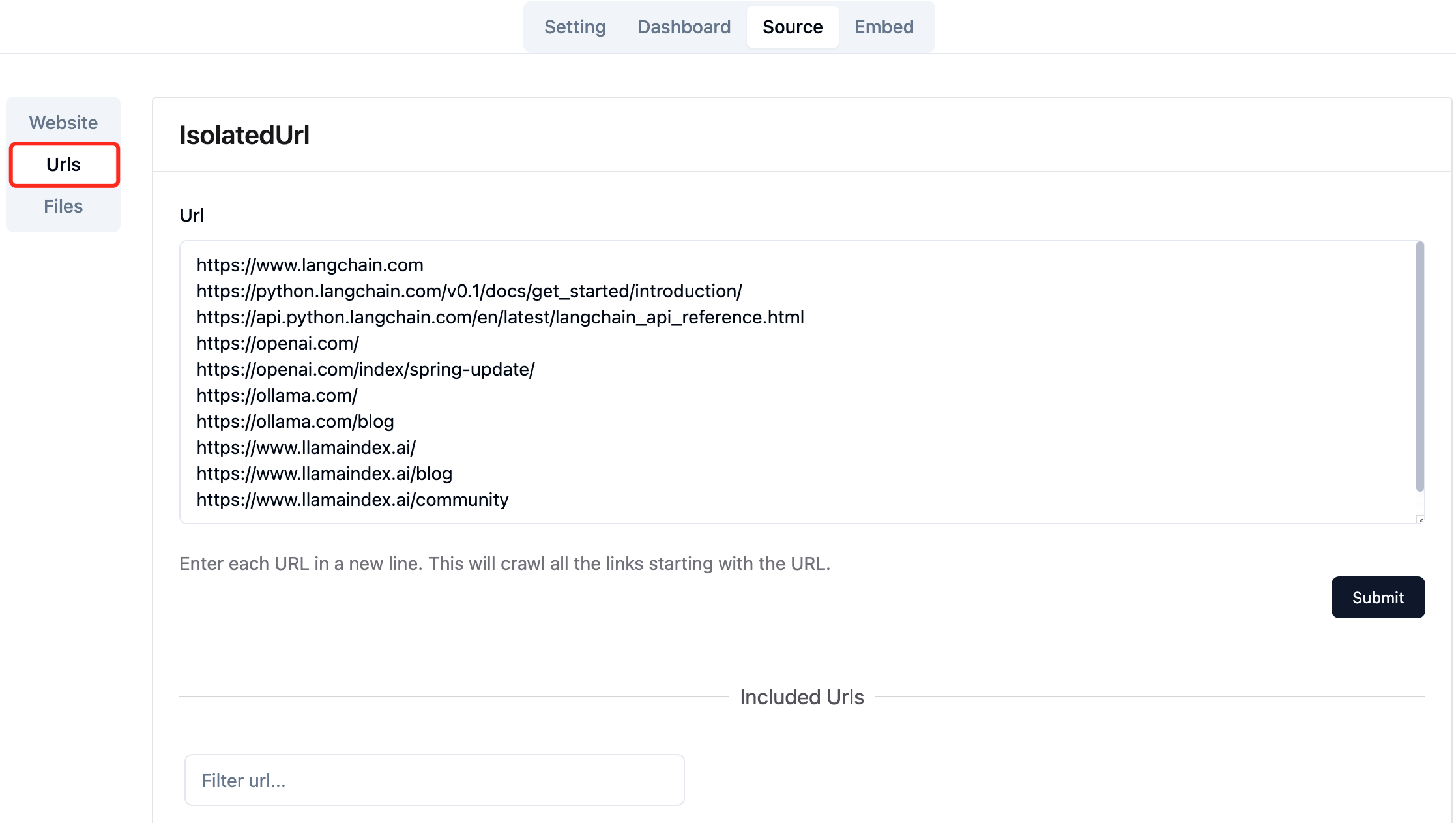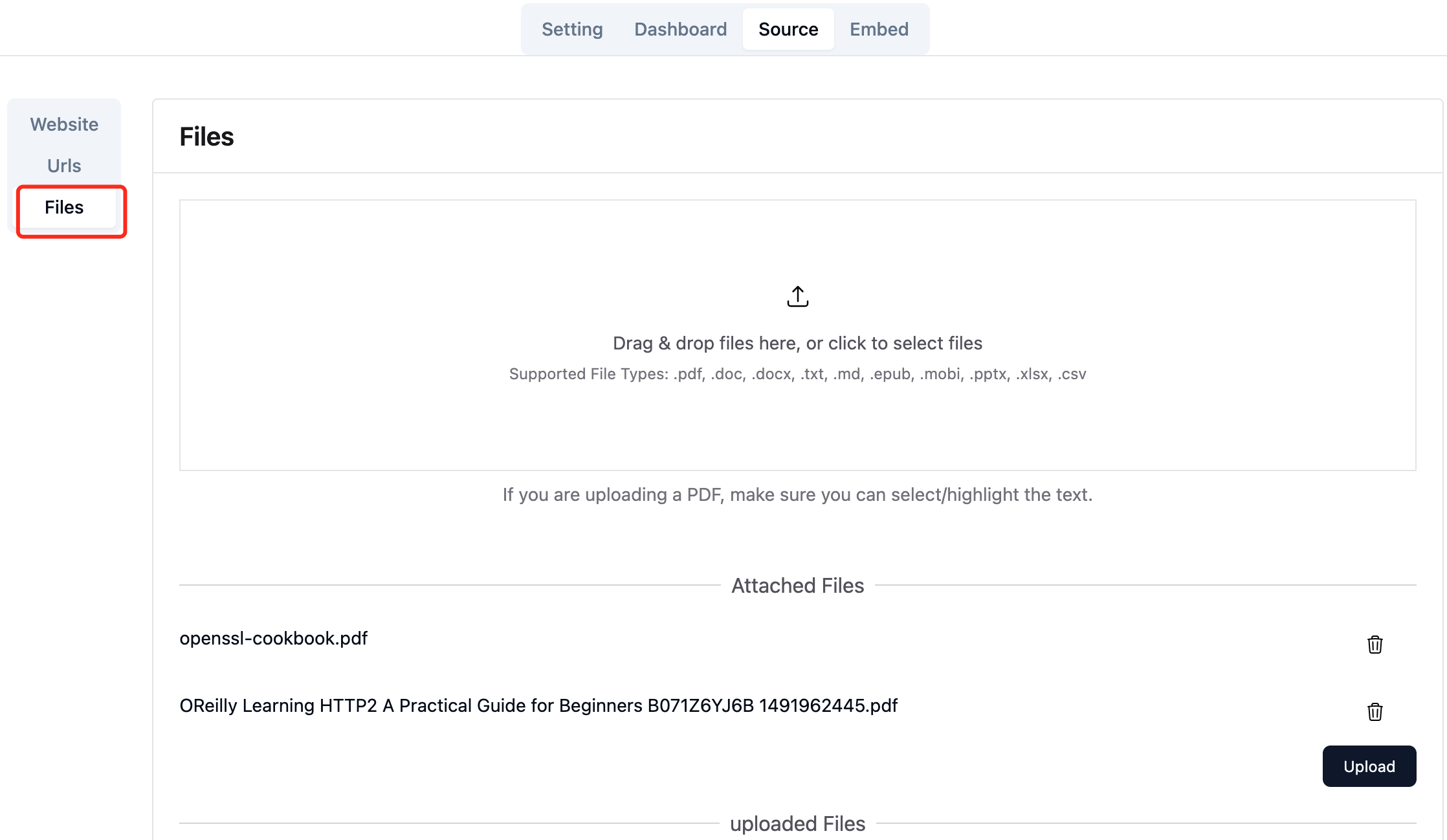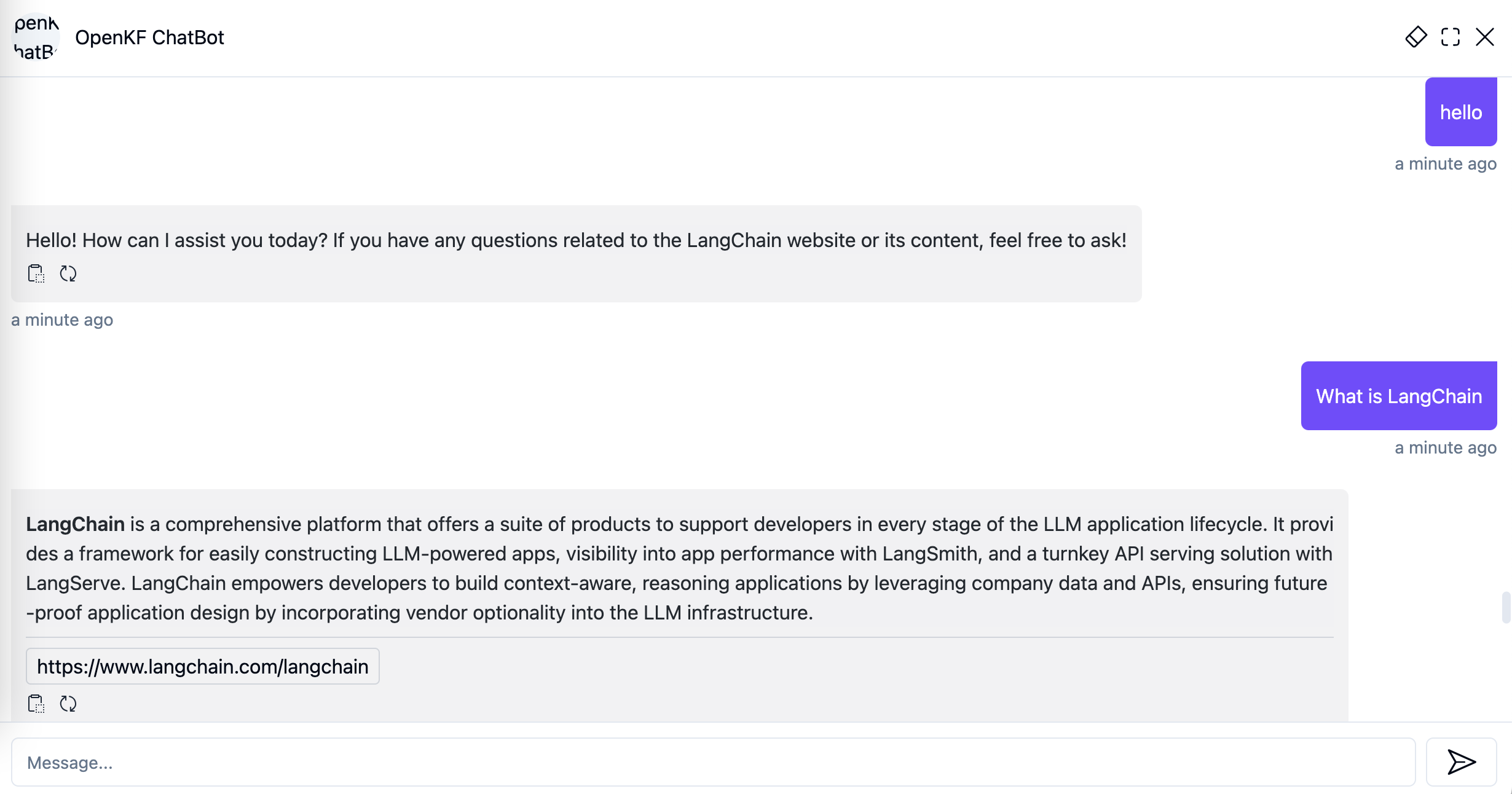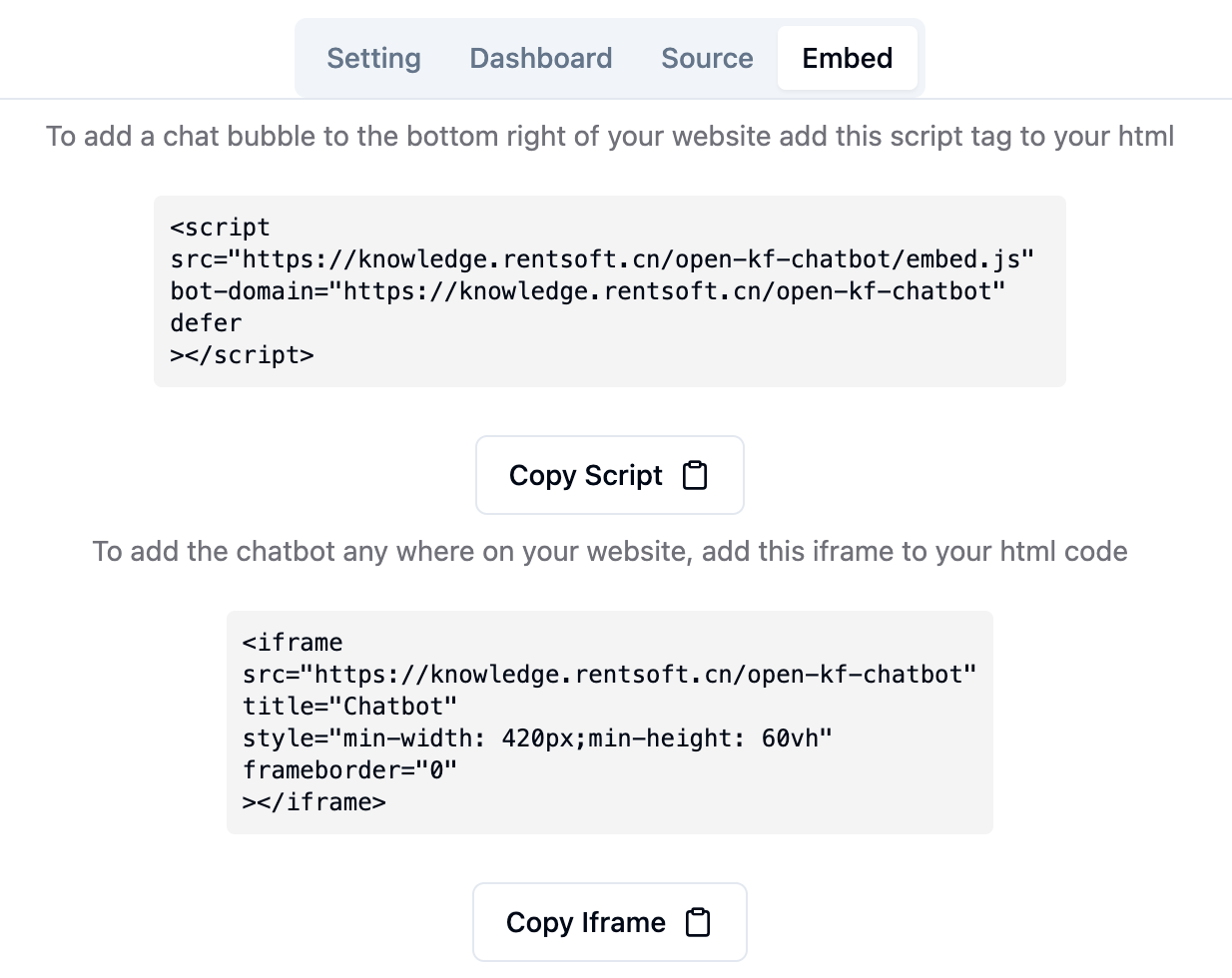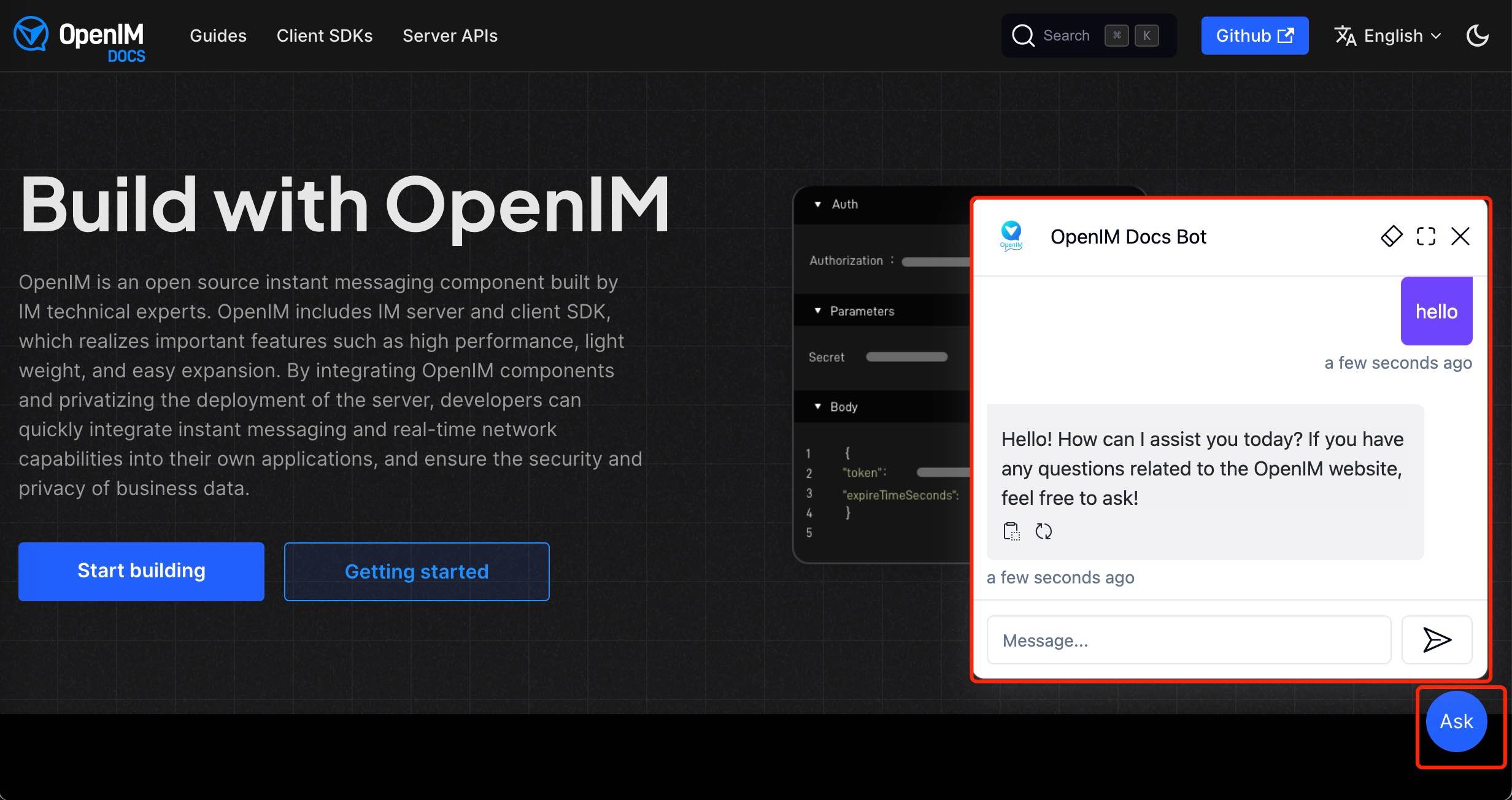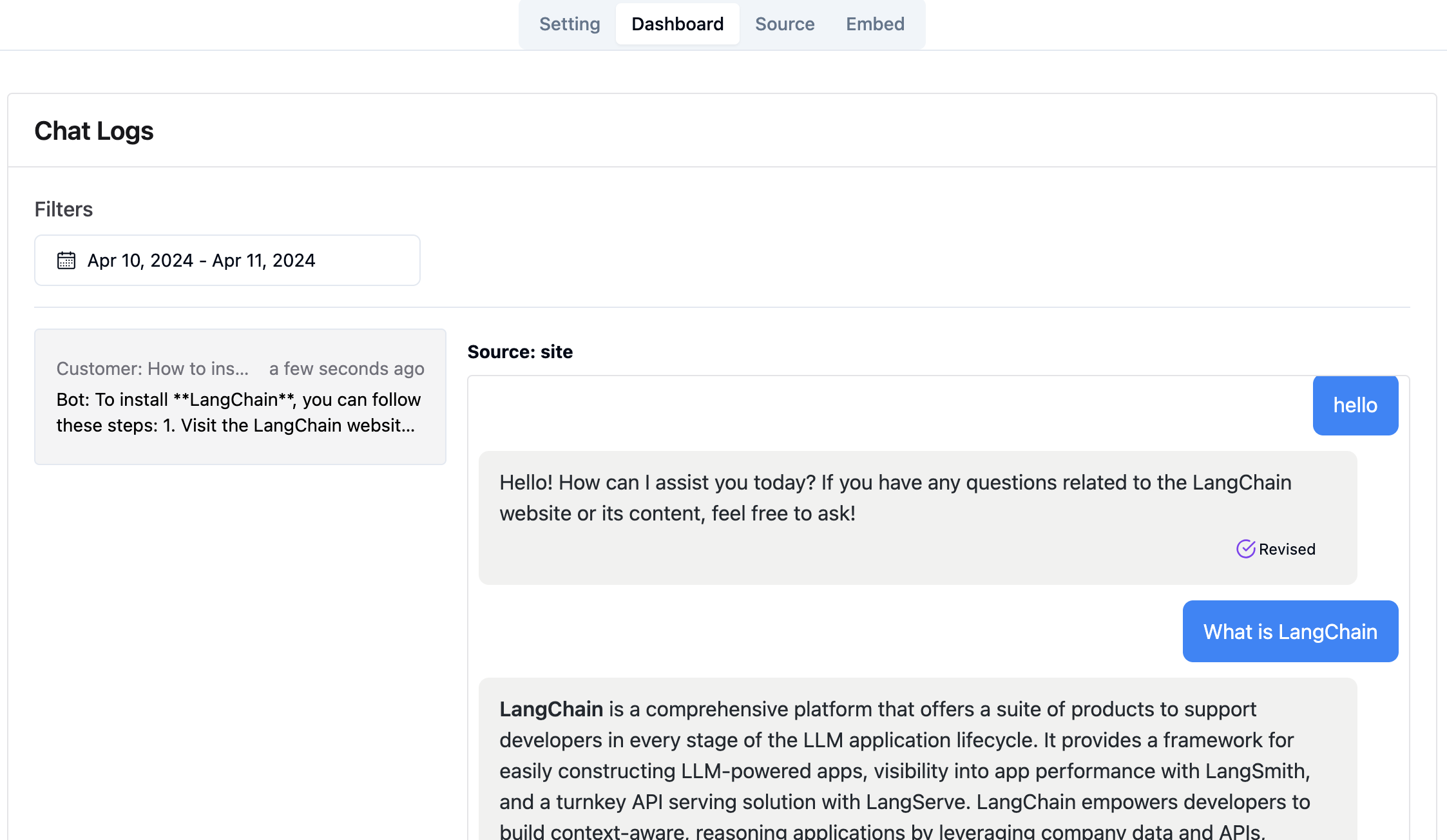Live Demo
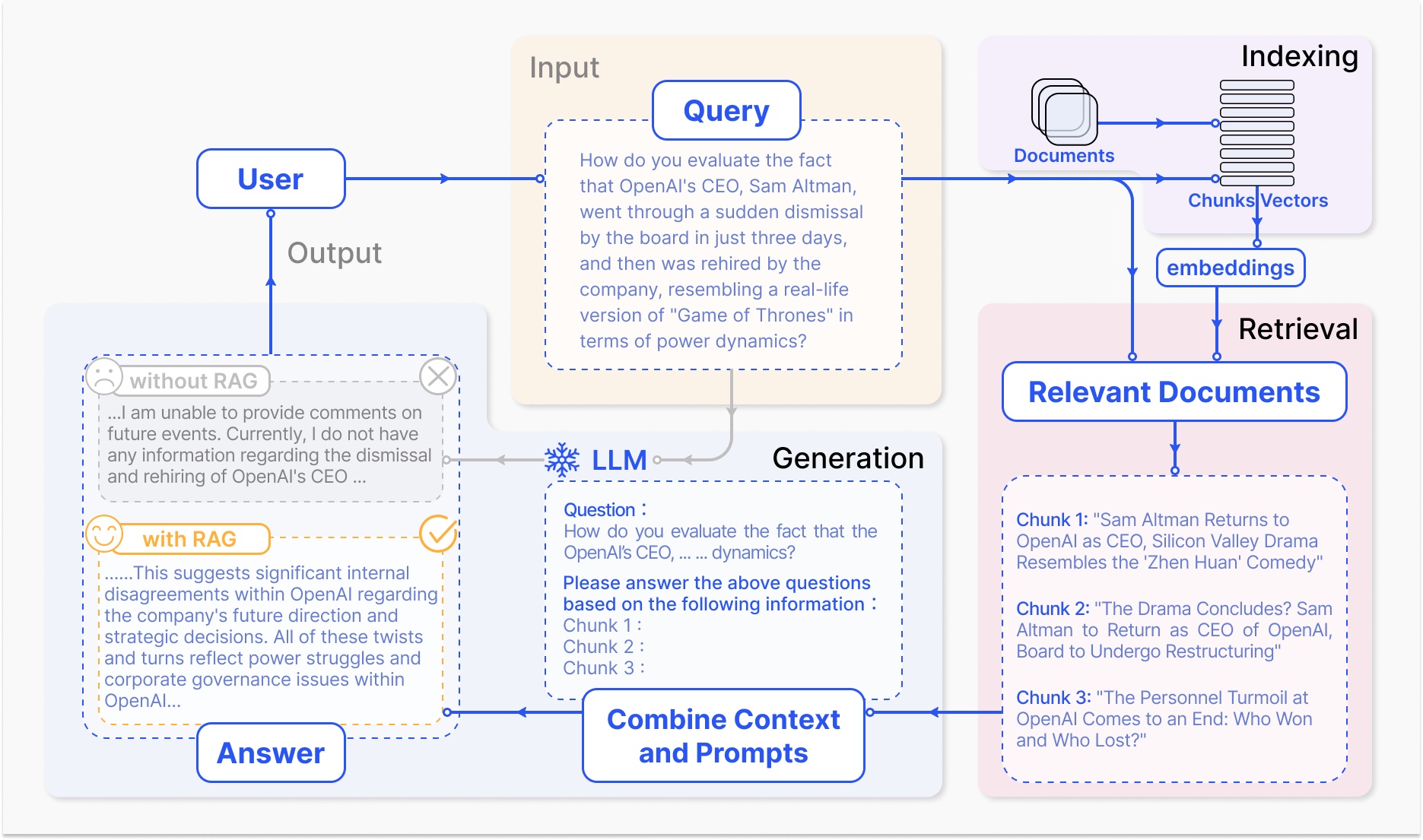
- Features
- Online Retrieval Architecture
- Deploy the RAG-GPT Service
- Configure the admin console
- The frontend of admin console and chatbot
- Built-in LLM Support: Support cloud-based LLMs and local LLMs.
- Quick Setup: Enables deployment of production-level conversational service robots within just five minutes.
- Diverse Knowledge Base Integration: Supports multiple types of knowledge bases, including websites, isolated URLs, and local files.
- Flexible Configuration: Offers a user-friendly backend equipped with customizable settings for streamlined management.
- Attractive UI: Features a customizable and visually appealing user interface.
Clone the repository:
git clone https://github.com/open-kf/rag-gpt.git && cd rag-gptBefore starting the RAG-GPT service, you need to modify the related configurations for the program to initialize correctly.
cp env_of_openai .envThe variables in .env
LLM_NAME="OpenAI"
OPENAI_API_KEY="xxxx"
GPT_MODEL_NAME="gpt-4o-mini"
MIN_RELEVANCE_SCORE=0.4
BOT_TOPIC="xxxx"
URL_PREFIX="http://127.0.0.1:7000/"
USE_PREPROCESS_QUERY=1
USE_RERANKING=1
USE_DEBUG=0
USE_LLAMA_PARSE=0
LLAMA_CLOUD_API_KEY="xxxx"
USE_GPT4O=0- Don't modify
LLM_NAME - Modify the
OPENAI_API_KEYwith your own key. Please log in to the OpenAI website to view your API Key. - Update the
GPT_MODEL_NAMEsetting, replacinggpt-4o-miniwithgpt-4-turboorgpt-4oif you want to use GPT-4. - Change
BOT_TOPICto reflect your Bot's name. This is very important, as it will be used inPrompt Construction. Please try to use a concise and clear word, such asOpenIM,LangChain. - Adjust
URL_PREFIXto match your website's domain. This is mainly for generating accessible URL links for uploaded local files. Such ashttp://127.0.0.1:7000/web/download_dir/2024_05_20/d3a01d6a-90cd-4c2a-b926-9cda12466caf/openssl-cookbook.pdf. - Set
USE_LLAMA_PARSEto 1 if you want to useLlamaParse. - Modify the
LLAMA_CLOUD_API_KEYwith your own key. Please log in to the LLamaCloud website to view your API Key. - Set
USE_GPT4Oto 1 if you want to useGPT-4omode. - For more information about the meanings and usages of constants, you can check under the
server/constantdirectory.
If you cannot use OpenAI's API services, consider using ZhipuAI as an alternative.
cp env_of_zhipuai .envThe variables in .env
LLM_NAME="ZhipuAI"
ZHIPUAI_API_KEY="xxxx"
GLM_MODEL_NAME="glm-4-air"
MIN_RELEVANCE_SCORE=0.4
BOT_TOPIC="xxxx"
URL_PREFIX="http://127.0.0.1:7000/"
USE_PREPROCESS_QUERY=1
USE_RERANKING=1
USE_DEBUG=0
USE_LLAMA_PARSE=0
LLAMA_CLOUD_API_KEY="xxxx"- Don't modify
LLM_NAME - Modify the
ZHIPUAI_API_KEYwith your own key. Please log in to the ZhipuAI website to view your API Key. - Update the
GLM_MODEL_NAMEsetting, the model list is['glm-3-turbo', 'glm-4', 'glm-4-0520', 'glm-4-air', 'glm-4-airx', 'glm-4-flash']. - Change
BOT_TOPICto reflect your Bot's name. This is very important, as it will be used inPrompt Construction. Please try to use a concise and clear word, such asOpenIM,LangChain. - Adjust
URL_PREFIXto match your website's domain. This is mainly for generating accessible URL links for uploaded local files. Such ashttp://127.0.0.1:7000/web/download_dir/2024_05_20/d3a01d6a-90cd-4c2a-b926-9cda12466caf/openssl-cookbook.pdf. - Set
USE_LLAMA_PARSEto 1 if you want to useLlamaParse. - Modify the
LLAMA_CLOUD_API_KEYwith your own key. Please log in to the LLamaCloud website to view your API Key. - For more information about the meanings and usages of constants, you can check under the
server/constantdirectory.
If you cannot use OpenAI's API services, consider using DeepSeek as an alternative.
Note
DeepSeek does not provide an Embedding API, so here we use ZhipuAI's Embedding API.
cp env_of_deepseek .envThe variables in .env
LLM_NAME="DeepSeek"
ZHIPUAI_API_KEY="xxxx"
DEEPSEEK_API_KEY="xxxx"
DEEPSEEK_MODEL_NAME="deepseek-chat"
MIN_RELEVANCE_SCORE=0.4
BOT_TOPIC="xxxx"
URL_PREFIX="http://127.0.0.1:7000/"
USE_PREPROCESS_QUERY=1
USE_RERANKING=1
USE_DEBUG=0
USE_LLAMA_PARSE=0
LLAMA_CLOUD_API_KEY="xxxx"- Don't modify
LLM_NAME - Modify the
ZHIPUAI_API_KEYwith your own key. Please log in to the ZhipuAI website to view your API Key. - Modify the
DEEPKSEEK_API_KEYwith your own key. Please log in to the DeepSeek website to view your API Key. - Update the
DEEPSEEK_MODEL_NAMEsetting if you want to use other models of DeepSeek. - Change
BOT_TOPICto reflect your Bot's name. This is very important, as it will be used inPrompt Construction. Please try to use a concise and clear word, such asOpenIM,LangChain. - Adjust
URL_PREFIXto match your website's domain. This is mainly for generating accessible URL links for uploaded local files. Such ashttp://127.0.0.1:7000/web/download_dir/2024_05_20/d3a01d6a-90cd-4c2a-b926-9cda12466caf/openssl-cookbook.pdf. - Set
USE_LLAMA_PARSEto 1 if you want to useLlamaParse. - Modify the
LLAMA_CLOUD_API_KEYwith your own key. Please log in to the LLamaCloud website to view your API Key. - For more information about the meanings and usages of constants, you can check under the
server/constantdirectory.
If you cannot use OpenAI's API services, consider using Moonshot as an alternative.
Note
Moonshot does not provide an Embedding API, so here we use ZhipuAI's Embedding API.
cp env_of_moonshot .envThe variables in .env
LLM_NAME="Moonshot"
ZHIPUAI_API_KEY="xxxx"
MOONSHOT_API_KEY="xxxx"
MOONSHOT_MODEL_NAME="moonshot-v1-8k"
MIN_RELEVANCE_SCORE=0.4
BOT_TOPIC="xxxx"
URL_PREFIX="http://127.0.0.1:7000/"
USE_PREPROCESS_QUERY=1
USE_RERANKING=1
USE_DEBUG=0
USE_LLAMA_PARSE=0
LLAMA_CLOUD_API_KEY="xxxx"- Don't modify
LLM_NAME - Modify the
ZHIPUAI_API_KEYwith your own key. Please log in to the ZhipuAI website to view your API Key. - Modify the
MOONSHOT_API_KEYwith your own key. Please log in to the Moonshot website to view your API Key. - Update the
MOONSHOT_MODEL_NAMEsetting if you want to use other models of Moonshot. - Change
BOT_TOPICto reflect your Bot's name. This is very important, as it will be used inPrompt Construction. Please try to use a concise and clear word, such asOpenIM,LangChain. - Adjust
URL_PREFIXto match your website's domain. This is mainly for generating accessible URL links for uploaded local files. Such ashttp://127.0.0.1:7000/web/download_dir/2024_05_20/d3a01d6a-90cd-4c2a-b926-9cda12466caf/openssl-cookbook.pdf. - Set
USE_LLAMA_PARSEto 1 if you want to useLlamaParse. - Modify the
LLAMA_CLOUD_API_KEYwith your own key. Please log in to the LLamaCloud website to view your API Key. - For more information about the meanings and usages of constants, you can check under the
server/constantdirectory.
If your knowledge base involves sensitive information and you prefer not to use cloud-based LLMs, consider using Ollama to deploy large models locally.
Note
First, refer to ollama to Install Ollama, and download the embedding model mxbai-embed-large and the LLM model such as llama3.
cp env_of_ollama .envThe variables in .env
LLM_NAME="Ollama"
OLLAMA_MODEL_NAME="xxxx"
OLLAMA_BASE_URL="http://127.0.0.1:11434"
MIN_RELEVANCE_SCORE=0.4
BOT_TOPIC="xxxx"
URL_PREFIX="http://127.0.0.1:7000/"
USE_PREPROCESS_QUERY=1
USE_RERANKING=1
USE_DEBUG=0
USE_LLAMA_PARSE=0
LLAMA_CLOUD_API_KEY="xxxx"- Don't modify
LLM_NAME - Update the
OLLAMA_MODEL_NAMEsetting, select an appropriate model from ollama library. - If you have changed the default
IP:PORTwhen startingOllama, please updateOLLAMA_BASE_URL. Please pay special attention, only enter the IP (domain) and PORT here, without appending a URI. - Change
BOT_TOPICto reflect your Bot's name. This is very important, as it will be used inPrompt Construction. Please try to use a concise and clear word, such asOpenIM,LangChain. - Adjust
URL_PREFIXto match your website's domain. This is mainly for generating accessible URL links for uploaded local files. Such ashttp://127.0.0.1:7000/web/download_dir/2024_05_20/d3a01d6a-90cd-4c2a-b926-9cda12466caf/openssl-cookbook.pdf. - Set
USE_LLAMA_PARSEto 1 if you want to useLlamaParse. - Modify the
LLAMA_CLOUD_API_KEYwith your own key. Please log in to the LLamaCloud website to view your API Key. - For more information about the meanings and usages of constants, you can check under the
server/constantdirectory.
Note
When deploying with Docker, pay special attention to the host of URL_PREFIX in the .env file. If using Ollama, also pay special attention to the host of OLLAMA_BASE_URL in the .env file. They need to use the actual IP address of the host machine.
docker-compose up --buildNote
Please use Python version 3.10.x or above.
It is recommended to install Python-related dependencies in a Python virtual environment to avoid affecting dependencies of other projects.
If you have not yet created a virtual environment, you can create one with the following command:
python3 -m venv myenvAfter creation, activate the virtual environment:
source myenv/bin/activateOnce the virtual environment is activated, you can use pip to install the required dependencies.
pip install -r requirements.txtThe RAG-GPT service uses SQLite as its storage DB. Before starting the RAG-GPT service, you need to execute the following command to initialize the database and add the default configuration for admin console.
python3 create_sqlite_db.pyIf you have completed the steps above, you can try to start the RAG-GPT service by executing the following command.
- Start single process:
python3 rag_gpt_app.py- Start multiple processes:
sh start.shNote
- The service port for RAG-GPT is
7000. During the first test, please try not to change the port so that you can quickly experience the entire product process. - We recommend starting the RAG-GPT service using
start.shin multi-process mode for a smoother user experience.
Access the admin console through the link http://your-server-ip:7000/open-kf-admin/ to reach the login page. The default username and password are admin and open_kf_AIGC@2024 (can be checked in create_sqlite_db.py).
After logging in successfully, you will be able to see the configuration page of the admin console.
On the page http://your-server-ip:7000/open-kf-admin/#/, you can set the following configurations:
- Choose the LLM base, currently only the
gpt-3.5-turbooption is available, which will be gradually expanded. - Initial Messages
- Suggested Messages
- Message Placeholder
- Profile Picture (upload a picture)
- Display name
- Chat icon (upload a picture)
After submitting the website URL, once the server retrieves the list of all web page URLs via crawling, you can select the web page URLs you need as the knowledge base (all selected by default). The initial Status is Recorded.
You can actively refresh the page http://your-server-ip:7000/open-kf-admin/#/source in your browser to get the progress of web page URL processing. After the content of the web page URL has been crawled, and the Embedding calculation and storage are completed, you can see the corresponding Size in the admin console, and the Status will also be updated to Trained.
Clicking on a webpage's URL reveals how many sub-pages the webpage is divided into, and the text size of each sub-page.
Clicking on a sub-page allows you to view its full text content. This will be very helpful for verifying the effects during the experience testing process.
Collect the URLs of the required web pages. You can submit up to 10 web page URLs at a time, and these pages can be from different domains.
Upload the required local files. You can upload up to 10 files at a time, and each file cannot exceed 30MB. The following file types are currently supported: [".txt", ".md", ".pdf", ".epub", ".mobi", ".html", ".docx", ".pptx", ".xlsx", ".csv"].
After importing website data in the admin console, you can experience the chatbot service through the link http://your-server-ip:7000/open-kf-chatbot/.
Through the admin console link http://your-server-ip:7000/open-kf-admin/#/embed, you can see the detailed tutorial for configuring the iframe in your website.
Through the admin console link http://your-server-ip:7000/open-kf-admin/#/dashboard, you can view the historical request records of all users within a specified time range.
The RAG-GPT service integrates 2 frontend modules, and their source code information is as follows:
An intuitive web-based admin interface for Smart QA Service, offering comprehensive control over content, configuration, and user interactions. Enables effortless management of the knowledge base, real-time monitoring of queries and feedback, and continuous improvement based on user insights.
An HTML5 interface for Smart QA Service designed for easy integration into websites via iframe, providing users direct access to a tailored knowledge base without leaving the site, enhancing functionality and immediate query resolution.


